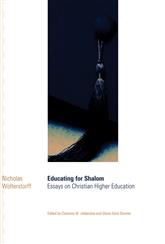 Educating for Shalom, by Nicholas Wolterstorff, Grand Rapids: Wm. B Eerdmans, 2004.
Educating for Shalom, by Nicholas Wolterstorff, Grand Rapids: Wm. B Eerdmans, 2004.
Summary: This collection of essays and talks written or given over a 30 year period traces Nicholas Wolterstorff’s journey of thinking about Christian higher education, the integration of faith and learning, and his growing concern that education result in the pursuit of justice and shalom.
Nicholas Wolterstorff is an emeritus professor of philosophical theology at Yale, having previously taught on the faculty at Calvin College, a Christian college in Grand Rapids, Michigan. The collection of essays and presentations that make up this collection were written or given over a 30 year period and chronicle how Wolterstorff’s conception of the task of Christians in higher education to connect faith and learning has changed over this time period.
Several of the essays in this collection chronicle that journey, giving the broad strokes of Wolterstorff’s emerging understanding. In essays like “Rethinking Christian Higher Education”, “Teaching for Shalom: On the Goal of Christian Collegiate Education”, “The Project of a Christian University in a Postmodern Culture”, and “Autobiography: The Story of Two Decades of Thinking About Christian Higher Education” he traces this journey. He began with the conception of his mentor, William Harry Jellema, of a Christian humanism concerned with applying Christian thought to the high culture of Western art, literature, and philosophy. As he went on to pursue graduate studies, this shifted to an academic discipline perspective, that immersed itself first of all in doing good work tackling original problems in the discipline and trying to think Christianly about them. Perhaps the watershed moment in Wolterstorff’s life was when he spent time in South Africa, and later among Palestinian Christians and became aware that education that does not eventuate in a concern for justice and human flourish-shalom is the best word to sum this up-is a sterile and barren enterprise.
Wolterstorff does not stop there. He also considers the question of what social practices contribute to the ethical formation of students who act for justice and shalom. He asks what moral dispositions incline students to act on intellectual convictions and how these moral virtues are developed through the educational process, a project James K.A. Smith has picked up in books like Desiring the Kingdom. Wolterstorff’s essay on “Teaching for Justice: On Shaping How Students Are Disposed to Act” is the clearest exposition of his thinking.
The remainder of the essays in one way or another explore how a Christian world and life view inform academic inquiry. He has a couple essays on Christian engagement with psychology, which seem somewhat dated being concerned more with the Freudian, Jungian, and Skinnerian approaches of the 70’s and 80’s than today’s cognitive and neuroscience based approaches. A couple essays explore the distinctive contribution of Abraham Kuyper to faith and learning. “The Point of Connection between Faith and Learning” explores the very different premises of the Christian who believes in regeneration and the materialist who believes only in empiricism. Yet both encounter the world through sensory data, the point of contact. In the other essay (“Abraham Kuyper on Christian Learning”), he contrasts Lockean rationalism, and its evangelical counterpart of evidentialism with Kuyper’s emphasis on the relationship of subject and object in any science-an anticipation of postmodern criticism by one hundred years.
Several other essays are also worth noting. He explores the contentious issue of academic freedom in religiously based institutions of higher education, noting that academic freedom is very different from freedom of speech. He also notes that those at religious institutions are free to advance views that would not be permitted in the secular context and thus that religiously based institutions may religiously qualify academic freedom, and religious faculty may in fact enjoy greater academic freedom in such contexts. In “Should the Work of our Hands Have Standing in the Christian College” he argues that physical work and creation of things should not be considered inferior to ideas. The collection closes with Wolterstorff’s fundamental agreement with Fides et Ratio and a call for Christian boldness in the world of ideas.

While Wolterstorff writes on Christian higher education, these essays are also of great worth for Christians working in higher education in the secular context. They are closely and well-reasoned works that demand careful attention and in return force one to think more deeply about what is meant by terms like “integration” or even “shalom” or “human flourishing”, all of which are bandied about. Equally, Wolterstorff paints an expansive and rich vision of the academic calling at its best.
Editor’s Note: Bob Trube first posted the above review on Bob on Books. As you may remember, Shalom was the theme for the 2015 InterVarsity Graduate and Faculty Ministries Staff Team Meetings. A number of resources connected with these meetings, including material by Wolterstorff, are posted at Living in Shalom.
Bob Trube is Associate Director of Faculty Ministry and Director of the Emerging Scholars Network. He blogs on books regularly at bobonbooks.com. He resides in Columbus, Ohio, with Marilyn and enjoys reading, gardening, choral singing, and plein air painting.

Leave a Reply